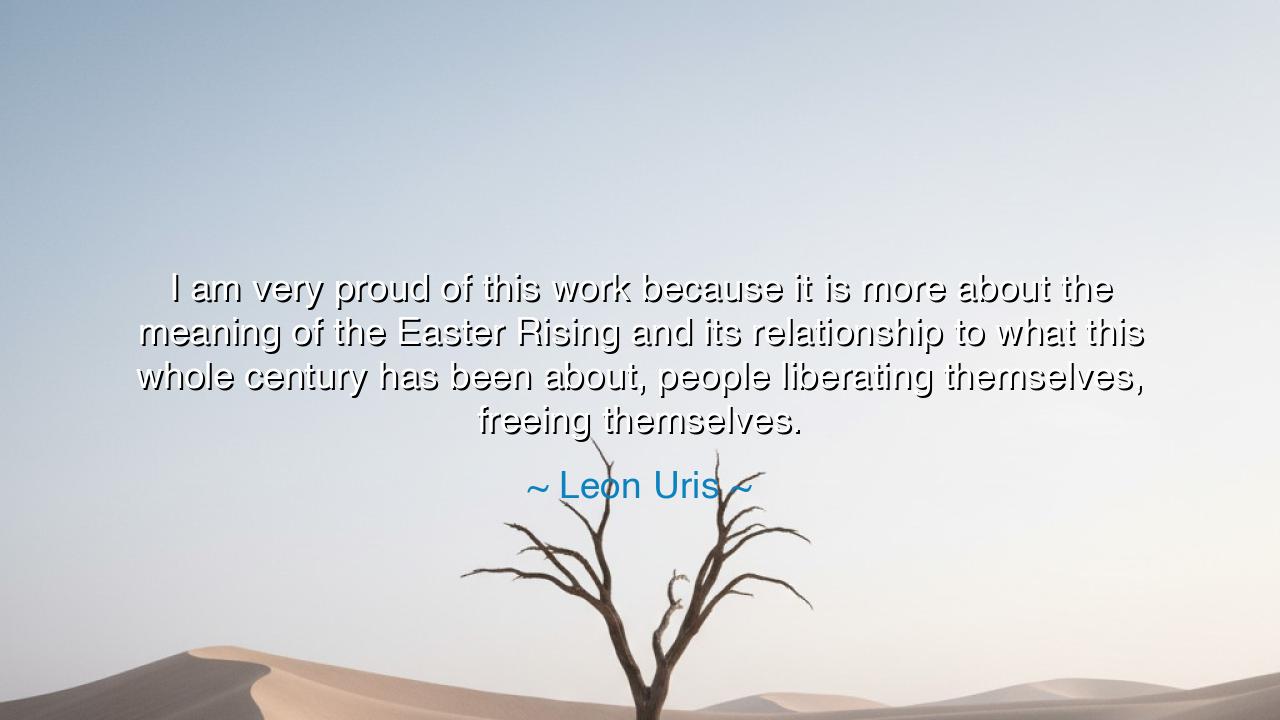
I am very proud of this work because it is more about the meaning
I am very proud of this work because it is more about the meaning of the Easter Rising and its relationship to what this whole century has been about, people liberating themselves, freeing themselves.






The words of Leon Uris—“I am very proud of this work because it is more about the meaning of the Easter Rising and its relationship to what this whole century has been about, people liberating themselves, freeing themselves”—carry the flame of freedom’s eternal struggle. Beneath their surface lies not merely a reflection on one historical event, but a meditation on the soul of human liberation itself. Uris, a novelist who chronicled the courage of oppressed peoples, saw in the Easter Rising not just the story of Ireland, but the story of humanity’s endless yearning to cast off chains—political, spiritual, and internal. His words rise like a hymn to the indomitable spirit that refuses to bow before tyranny.
The Easter Rising of 1916 was a rebellion of poets and dreamers, an uprising of men and women who dared to defy the might of empire. Though crushed in blood and fire, it planted seeds that would one day bloom into freedom. Uris, in his writing, understood that the event’s true significance was not its immediate success or failure, but its symbolism—a reminder that freedom often begins as an act of faith. The rebels knew they could not win militarily, yet they rose so that their sacrifice would awaken a nation’s soul. In this, Uris saw a universal truth: that every century, in every land, people must rise anew to reclaim the dignity of their own existence.
When Uris speaks of “the meaning of the Easter Rising and its relationship to what this whole century has been about,” he points to the broader current of self-liberation that defined the twentieth century. Across continents, from the fields of Ireland to the streets of India, from the mountains of Algeria to the rice paddies of Vietnam, peoples under domination began to stand upright. The century was an age of rebellion against the structures of oppression—colonialism, racism, totalitarianism. It was, as Uris suggests, the age when humanity began to remember its birthright: that no man or woman is born to serve another, and that freedom, once awakened, cannot be silenced.
Uris’s pride in his work, then, is not pride in art alone—it is pride in bearing witness to this eternal rhythm of resistance. He was a storyteller who gave voice to those who history often silences. In works like Trinity, he illuminated the Irish struggle for freedom not as a tale of war, but as a testament to endurance—to the capacity of ordinary people to rise from despair through faith, family, and fire. His pride comes from this: that his art was not decoration, but declaration—a mirror held up to the courage that courses through generations who dare to say, “Enough.”
History is rich with such acts of defiance that mirror the spirit of the Easter Rising. Consider the Warsaw Ghetto Uprising of 1943, when Jewish resistance fighters, outnumbered and starved, chose to fight the Nazi regime rather than go quietly to their deaths. Like the Irish rebels, they fought not for victory, but for honor—to affirm their humanity in a world that sought to erase it. Or think of Mahatma Gandhi’s Salt March, where thousands walked in peace to defy an empire, showing that liberation can also be achieved through the power of conscience. In each case, as Uris saw, the essence of the struggle was the same: people, in their own way, freeing themselves—reclaiming their dignity, their identity, their right to exist as free souls.
Uris’s words are not only a reflection on history, but a challenge to all who live in comfort or complacency. For the fight for freedom is not confined to the battlefield or the colony—it begins within. Every man and woman must face the inner empire, the chains of fear, apathy, and resignation that keep the spirit enslaved. To “liberate oneself,” as Uris suggests, is to awaken from the sleep of conformity, to act according to conscience even when it costs something. The rebels of Easter rose against an empire; today, each of us must rise against indifference.
The lesson, therefore, is eternal: that freedom is not granted—it is claimed. It is born from the courage to imagine a different world and the will to suffer for its coming. Uris’s words call us to remember that the story of liberation is not yet complete—it continues in every age, under every flag, in every heart that refuses submission. To honor the Easter Rising is not merely to remember the dead, but to live as they did—with conviction, compassion, and an unbreakable belief in human dignity.
And so, let his words be passed down to future generations as both remembrance and warning: that the meaning of freedom lies not in its possession, but in its pursuit. Each century must rise again, for the forces that bind the human spirit are tireless. Yet so too is the spirit of liberation. It burns quietly in every heart that dares to say, “I am free.” And while that fire lives, no empire—be it of men or of fear—can ever truly prevail.






AAdministratorAdministrator
Welcome, honored guests. Please leave a comment, we will respond soon